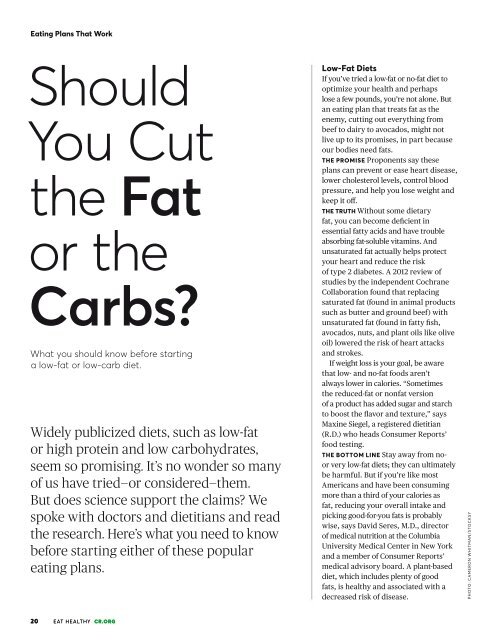You also want an ePaper? Increase the reach of your titles
YUMPU automatically turns print PDFs into web optimized ePapers that Google loves.
<strong>Eat</strong>ing Plans That Work<br />
Should<br />
You Cut<br />
the Fat<br />
or the<br />
Carbs?<br />
What you should know before starting<br />
a low-fat or low-carb diet.<br />
Widely publicized diets, such as low-fat<br />
or high protein <strong>and</strong> low carbohydrates,<br />
seem so promising. It’s no wonder so many<br />
of us have tried—or considered—them.<br />
But does science support the claims? We<br />
spoke w<strong>it</strong>h doctors <strong>and</strong> diet<strong>it</strong>ians <strong>and</strong> read<br />
the research. Here’s what you need to know<br />
before starting e<strong>it</strong>her of these popular<br />
eating plans.<br />
Low-Fat Diets<br />
If you’ve tried a low-fat or no-fat diet to<br />
optimize your health <strong>and</strong> perhaps<br />
lose a few pounds, you’re not alone. But<br />
an eating plan that treats fat as the<br />
enemy, cutting out everything from<br />
beef to dairy to avocados, might not<br />
live up to <strong>it</strong>s promises, in part because<br />
our bodies need fats.<br />
THE PROMISE Proponents say these<br />
plans can prevent or ease heart disease,<br />
lower cholesterol levels, control blood<br />
pressure, <strong>and</strong> help you lose weight <strong>and</strong><br />
keep <strong>it</strong> off.<br />
THE TRUTH W<strong>it</strong>hout some dietary<br />
fat, you can become deficient in<br />
essential fatty acids <strong>and</strong> have trouble<br />
absorbing fat-soluble v<strong>it</strong>amins. And<br />
unsaturated fat actually helps protect<br />
your heart <strong>and</strong> reduce the risk<br />
of type 2 diabetes. A 2012 review of<br />
studies by the independent Cochrane<br />
Collaboration found that replacing<br />
saturated fat (found in animal products<br />
such as butter <strong>and</strong> ground beef) w<strong>it</strong>h<br />
unsaturated fat (found in fatty fish,<br />
avocados, nuts, <strong>and</strong> plant oils like olive<br />
oil) lowered the risk of heart attacks<br />
<strong>and</strong> strokes.<br />
If weight loss is your goal, be aware<br />
that low- <strong>and</strong> no-fat foods aren’t<br />
always lower in calories. “Sometimes<br />
the reduced-fat or nonfat version<br />
of a product has added sugar <strong>and</strong> starch<br />
to boost the flavor <strong>and</strong> texture,” says<br />
Maxine Siegel, a registered diet<strong>it</strong>ian<br />
(R.D.) who heads <strong>Consumer</strong> <strong>Reports</strong>’<br />
food testing.<br />
THE BOTTOM LINE Stay away from noor<br />
very low-fat diets; they can ultimately<br />
be harmful. But if you’re like most<br />
Americans <strong>and</strong> have been consuming<br />
more than a third of your calories as<br />
fat, reducing your overall intake <strong>and</strong><br />
picking good-for-you fats is probably<br />
wise, says David Seres, M.D., director<br />
of medical nutr<strong>it</strong>ion at the Columbia<br />
Univers<strong>it</strong>y Medical Center in New York<br />
<strong>and</strong> a member of <strong>Consumer</strong> <strong>Reports</strong>’<br />
medical advisory board. A plant-based<br />
diet, which includes plenty of good<br />
fats, is healthy <strong>and</strong> associated w<strong>it</strong>h a<br />
decreased risk of disease.<br />
PHOTO: CAMERON WHITMAN/STOCKSY<br />
20 EAT HEALTHY CR.ORG


















